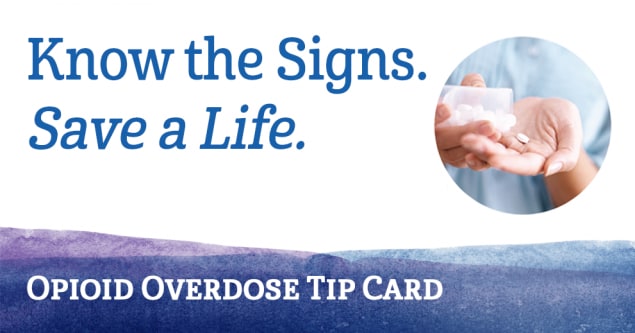Save a Life from Prescription Opioid Overdose
Death from an opioid overdose happens when too much of the drug overwhelms the brain and interrupts the body’s natural drive to breathe. During an overdose, breathing can be dangerously slowed or stopped, causing brain damage or death. It’s important to recognize the signspdf icon and act fast. Signs include:
- Small, constricted “pinpoint pupils”
- Falling asleep or loss of consciousness
- Slow, shallow breathing
- Choking or gurgling sounds
- Limp body
- Pale, blue, or cold skin
It may be hard to tell if a person is high or experiencing an overdose. If you aren’t sure, it’s best to treat it like an overdose— you could save a life.
- Call 911 immediately.
- Administer naloxone, if available.
- Try to keep the person awake and breathing.
- Lay the person on their side to prevent choking.
- Stay with him or her until emergency workers arrive.
Make sure you know all the risks and benefits of treatments and how to reduce the risk of opioid addiction and overdose.
- Make sure you’re getting care that is safe, effective, and right for you. Talk with your doctor about setting goals for your pain management.
- Talk with your doctor about acute painpdf icon, chronic painpdf icon, and how to avoid addictionpdf icon.
- Ask your doctor about non-opioid options for treating pain, including medications other than opioids as well as nonpharmacologic options, like exercise.
- Always let your doctor know about any side effects or concerns you may have.
If Prescribed Opioids, Practice Responsible Use
- Never take prescription opioids in greater amounts or more often than prescribed.
- Always let your doctor knowpdf icon about any side effects or concerns you may have about your medications.
- Avoid taking opioids with alcohol and other substances or medications. It is very dangerous to combine opioids with other drugs, especially those that cause drowsiness:
-
-
- Benzodiazepines (such as Xanax® and Valium®)
- Muscle relaxants (such as Soma® or Flexeril®)
- Hypnotics (such as Ambien® or Lunesta®)
- Other prescription opioids
-
- Do not share or sell your prescription opioids.
- Keep medicines in a safe and secure place. Store opioids in a place that is locked, like a keyed medicine cabinet or drawer, to keep them secure from children, family, friends, and visitors.
- Properly discard expired or unused prescription opioids. Remove them from your home as soon as possible to reduce the chances of misuse. To get rid of prescription opioids and other medications safely:
-
-
- Find a medicine take-back option near you: TakeBackDay.DEA.govexternal icon
- Check with your pharmacist to see if you can return unused medication to the pharmacy.
-
Help a Person Who May be Struggling with Addiction

If you or someone close to you needs help for a substance use disorder, talk to your doctor or call SAMHSA’s National Helpline at 1-800-662-HELP or go to SAMHSA’s Behavioral Health Treatment Services Locatorexternal icon.
- Learn about naloxoneexternal icon, a life-saving drug that can reverse the effects of an opioid overdose when administered in time.
- Find out more about naloxone laws and naloxone access in your stateexternal icon.
- Good Samaritan Lawsexternal icon in your state protect overdose victims and people seeking medical help for an overdose victim from drug possession charges.
- Explore resources available to help with overdose prevention.
- CDC Opioid Overdose Tip Cardpdf icon
- CDC Feature: Talk to Your Doctor About Managing Your Pain
- CDC’s Up and Awayexternal icon public education campaign
- Food and Drug Administration (FDA) Remove the Riskexternal icon toolkit
- Drug Enforcement Agency (DEA) Secure Your Medsexternal icon campaign
